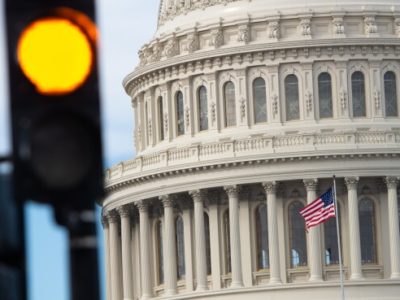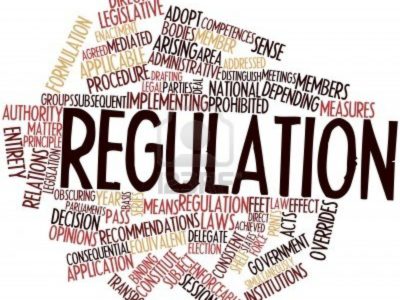Congressional Review Act
Congressional Cancel Culture
Once again, the Congressional Review Act rears its ugly head.
The Congressional Review Act (CRA) provides a fast-track process for canceling regulations if they hit an ideological nerve or offend a powerful special interest. Congressional Republicans are busily trying use it to cancel environmental regulations. Earlier this month, the target was a regulation encouraging pension managers to consider the impact of climate risks on their …
Continue reading “Congressional Cancel Culture”
CONTINUE READINGWhen Bad Things Happen to Good Regulations
The GOP’s effort cancel a pension reg illustrates the evils of the Congressional Review Act.
In their crusade against “wokeness,” congressional Republicans are taking aim at Labor Department rule about pension plan investments. The rule’s transgression is apparently that it makes easier for pension plans to consider how climate-related risks might affect a company’s bottom line. To avoid being woke, the GOP would apparently prefer pension managers to close their …
Continue reading “When Bad Things Happen to Good Regulations”
CONTINUE READINGClarifying the Congressional Review Act
The Ninth Circuit rules on the preclusive effect of a CRA disapproval in a wilderness protection case.
Soon after Trump took office, Republicans used the Congressional Review Act (CRA) to overturn sixteen Obama-era regulations. If they win control of the government in 2024, they’ll undoubtedly do the same thing to Biden regulations. It behooves us, then, to understand the effect of these legislative interventions. A Ninth Circuit ruling last week in a …
Continue reading “Clarifying the Congressional Review Act”
CONTINUE READINGClimate News from Capitol Hill
There are small but hopeful signs of progress in overcoming legislative gridlock.
Over a decade ago, the Waxman-Markey carbon trading bill died in the Senate. President Obama then had to rely entirely on administrative actions to address climate change. Republicans united in a solid wall of violent opposition to climate action. There are some hopeful signs that things may not be quite so tough for President Biden. …
Continue reading “Climate News from Capitol Hill”
CONTINUE READINGThe Controversial Congressional Review Act
Biden has a congressional shortcut to cancel Trump’s regulatory rollbacks, but it comes with risks.
The Trump administration dedicated itself to deregulation with unprecedented fervor. It rolled back scores of regulations across government agencies, including more than 80 environmental rules. The Biden administration can reverse some of those actions quickly – for instance, as president, Joe Biden can undo Donald Trump’s executive orders with a stroke of the pen. He …
Continue reading “The Controversial Congressional Review Act”
CONTINUE READINGThe CRA is Back in Play
What you need to know about the Congressional Review Act and Trump’s regulatory legacy
This post is co-authored by Beth Kent and Cara Horowitz Last week’s Georgia Senate victories have given Democrats (bare) control of the Senate—and, with it, the potential to use the Congressional Review Act (CRA) to erase some of the Trump Administration’s regulatory rollbacks. Here are four key things to know about this unique legislative oversight …
Continue reading “The CRA is Back in Play”
CONTINUE READINGThe Georgia Elections, the Republican Schism, and the Environment
The prospects for a green stimulus bill have improved
Although the word is overused, last week really did see a seismic shift in the political world. Actually, there were two earthquakes — the victories of Democrats Warnock and Ossoff in Georgia, and the violent invasion of the U.S. capitol incited by Trump. While the significance of these events is much broader, their relevance to …
Continue reading “The Georgia Elections, the Republican Schism, and the Environment”
CONTINUE READINGShould a New Congress Use a Deeply Flawed Law to Cancel Trump’s Regulations?
The Congressional Review Act was Newt Gingrich’s brainchild. It should be repealed.
The Congressional Review Act (CRA), part of Newt Gingrich’s “Contract With America”, slumbered for many years in obscurity. Then, in 2017, Congress dusted it off and used it to kill fifteen Obama administration regulations. I’m not the first to ask whether there should be payback if the White House and Senate change hands. There are …
Continue reading “Should a New Congress Use a Deeply Flawed Law to Cancel Trump’s Regulations?”
CONTINUE READINGSidestepping Regulatory Ossification
The regulatory process can take forever. Here are some possible responses.
Some years ago, Tom McGarity coined the phrase “regulatory ossification” to describe the increasingly slow and cumbersome regulatory system. Since then, the situation has only gotten worse. As a recent article by Bethany Davis Noll and Richard Revesz points out, significant regulations take an average of four years to issue, and judicial review adds another …
Continue reading “Sidestepping Regulatory Ossification”
CONTINUE READINGRegulatory Review in Anti-Regulatory Times: Congress
Congress overturned a host of regs at the start of the Trump Administration. Looks more like a random walk than a systematic effort.
In theory, cost-benefit analysis should be just as relevant when the government is deregulating as when it is imposing new regulations. But things don’t seem to work that way. This is the second of two blog posts analyzing how costs and benefits figured in decisions during the past two years of unified GOP control of …
Continue reading “Regulatory Review in Anti-Regulatory Times: Congress”
CONTINUE READING








